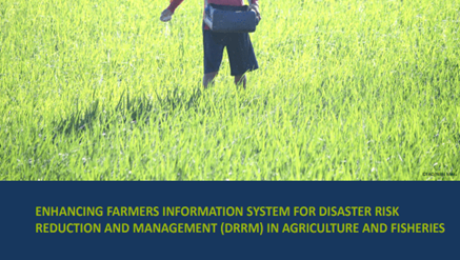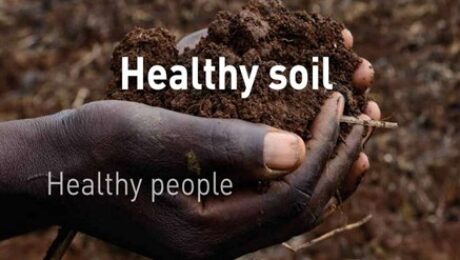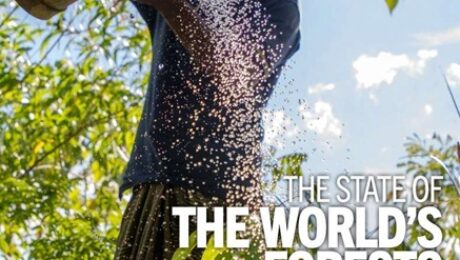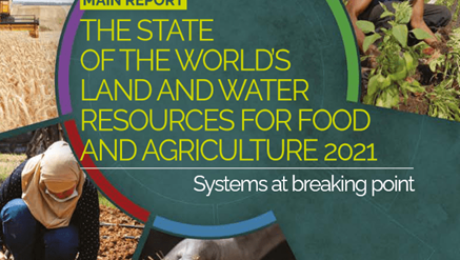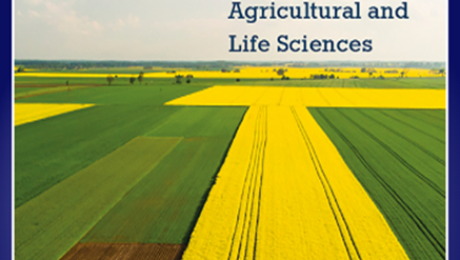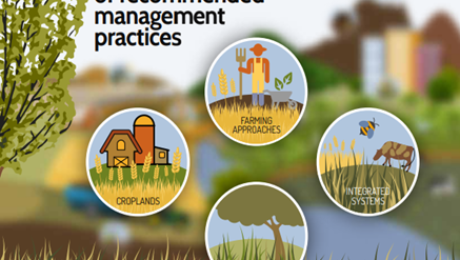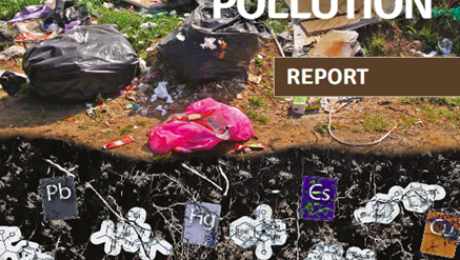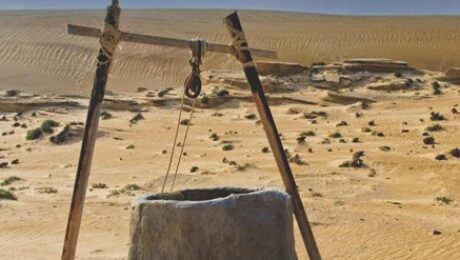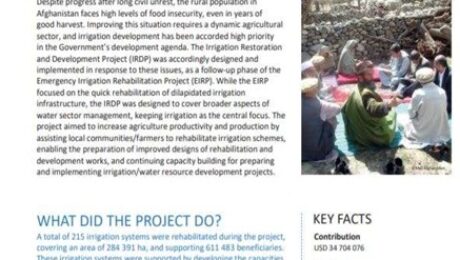Enhancing Farmers Information System for Disaster Risk Reduction and Management (DRRM) in Agriculture and Fisheries
Agriculture plays a significant role in the economy of the Philippines The resiliency of the agriculture sector not only ensures the country’s food security but also the incomes of households depending on this sector, and the sectors along its value chain However, the country has the second highest exposure to natural hazards of any country in the world, owing to its location in the typhoon belt, through which storms generated in the western Pacific Ocean pass Agriculture is highly vulnerable to these natural hazards, because of the sector’s spatially fixed, environment sensitive, and high investment nature Philippine farmers bear the brunt of the damage caused by these calamities.
- Published in LIVESTOCK / FISHERIES, NATURAL RESOURCE MANAGEMENT
Rural 21: Current Issue: Vol. 56 No. 2/2022
We cannot live without healthy soil and land. It is on these resources that we produce most of our food and build our homes. We need them to provide clean water and precious plant nutrients, to conserve biological diversity and to cope with climate change. And they form the basis for the livelihoods of millions of people. But despite such known facts, these valuable resources are in a dire state. A third of all soils world-wide are already degraded, and each year, further huge expanses of fertile land go lost.
We know that the only way to reverse this trend is with a paradigm shift – away from a resource-intensive mode of production and towards a resource-friendly mode considering the planetary boundaries while placing our global agricultural and food systems on sustainable foundations. Our authors and interview partners share examples of global and national initiatives and policies as well as research insights and practical examples addressing this topic with you.
- Published in NATURAL RESOURCE MANAGEMENT
FAO (2022) The State of World’s Forests
Extension, farmer-field-school approaches and peer-to-peer exchanges can strengthen local capacities and innovation Contemporary approaches to forest education include extension, farmer-field-school approaches, peer-to-peer exchanges and business incubation505,531 to provide smallholders, local forest-based businesses, local communities, Indigenous Peoples and forest workers with learning opportunities and access to technical support.506,507,508 In many countries, however, forestry extension services have been weakened due to financial, political and structural constraints. Existing extension and development programmes are often rooted in technocentric approaches focused on pre-selected “best practices” that treat forest communities as passive learners. They also rarely involve farmers and local knowledge-holders in training development and thus inadequately address knowledge needs and gaps.
- Published in NATURAL RESOURCE MANAGEMENT
The State of the World’s Land and Water Resources for Food and Agriculture 2021 – Systems at breaking point
Satisfying the changing food habits and increased demand for food intensifies pressure on the world’s water, land and soil resources. However, agriculture bears great promise to alleviate these pressures and provide multiple opportunities to contribute to global goals. Sustainable agricultural practices lead to water saving, soil conservation, sustainable land management, conservation of natural resources, ecosystem and climate change benefits. Accomplishing this requires accurate information and a major change in how we manage these resources. It also requires complementing efforts from outside the natural resources management domain to maximize synergies and manage trade-offs.
The objective of SOLAW 2021 is to build awareness of the status of land and water resources, highlighting the risks, and informing on related opportunities and challenges, also underlining the essential contribution of appropriate policies, institutions and investments. Recent assessments, projections and scenarios from the international community show the continued and increasing depletion of land and water resources, loss of biodiversity, associated degradation and pollution, and scarcity in the primary natural resources. SOLAW 2021 highlights the major risks and trends related to land and water and presents means of resolving competition among users and generating multiple benefits for people and the environment. The DPSIR framework was followed in order to identify the Drivers, Pressures, Status, Impact and Responses. SOLAW 2021 provides an update of the knowledge base and presents a suite of responses and actions to inform decision-makers in the public, private, and civil sectors for a transformation from degradation and vulnerability toward sustainability and resilience.
- Published in NATURAL RESOURCE MANAGEMENT
24-hour Global Marathon for Sustainability – Food for Earth (2021)
The FAO elearning Academy together with Future Food Institute, organized the second edition of the 24-hour Global Digital Marathon for Sustainability entitled: “Food for Earth”, in 2021. The event was a knowledge sharing collaborative initiative, fully aligned with the United Nations Sustainable Development Goals Agenda 2030 and FAO’s Strategic Framework. The Marathon has proven to be an extremely powerful initiative to raise awareness among entrepreneurs, startups, scientists, journalists, young leaders, policymakers, general public, farmers and indigenous peoples on the importance of environmental, economic and social sustainability.
The publication aims at gathering the multilingual work sessions spread out across the globe, all focusing on the regenerative power of food systems. Overall, the 2021 Marathon had a fantastic global impact, bringing together more than 160 expert voices, in 30 main work sessions, in English, French, Italian and Spanish, reaching more than 150 000 views worldwide, and a global coverage from over 100 online journals, TV channels and networks. In addition, ministers and government representatives from more than 30 countries contributed and endorsed the event. As a result, participating countries have proposed and committed to implement more than 100 climate actions.
- Published in NATURAL RESOURCE MANAGEMENT
Farmers and scientists in AR4D: Looking at a watershed management project through an STS lens
Agricultural Research for Development (AR4D) provides the interface for the meeting of farmers and scientists. This is a meeting of different social worlds, contesting agendas, cultures of cooperation and networks of actors. Like in other disciplines, scientists in AR4D have developed their own culture of science. However, the role of their culture of science in the negotiations and encounters with farmers’ social worlds is rarely discussed. Analysing AR4D with a theoretical framework based on Science and Technology Studies (STS) helps us to highlight important issues of power and access in AR4D. The goal of this paper is to demonstrate how the introduction of certain technologies has interacted with the lives of people in an AR4D project in Ethiopia, and to highlight the potential and limitations of applying STS to AR4D. We interviewed farmers, scientists, extensionists, policy makers and donors associated with an AR4D project in the Ethiopian Highlands using qualitative social research approaches. Akrich’s theory on scripts provided the theoretical framework for analysis. Our findings provide examples for the re-inscription of technology and access in an AR4D project, leading to trade-offs and shifting of power between different actors. We conclude that understanding AR4D as part of a network of actors with its own culture of science provides an essential learning ground. We recommend STS to be applied more widely in AR4D to explore the nature of these networks to highlight what makes technology work for users in the long term.
- Published in NATURAL RESOURCE MANAGEMENT
Recarbonizing global soils: A technical manual of recommended sustainable soil management
During the last decades, soil organic carbon (SOC) attracted the attention of a much wider array of specialists beyond agriculture and soil science, as it was proven to be one of the most crucial components of the earth’s climate system, which has a great potential to be managed by humans. Soils as a carbon pool are one of the key factors in several Sustainable Development Goals, in particular Goal 15, “Protect, restore and promote sustainable use of terrestrial ecosystems, sustainably manage forests, combat desertification and halt and reverse land degradation and halt biodiversity loss” with the SOC stock being explicitly cited in Indicator 15.3.1.
This technical manual is the first attempt to gather, in a standardized format, the existing data on the impacts of the main soil management practices on SOC content in a wide array of environments, including the advantages, drawbacks and constraints. This manual presents different sustainable soil management (SSM) practices at different scales and in different contexts, supported by case studies that have been shown with quantitative data to have a positive effect on SOC stocks and successful experiences of SOC sequestration in practical field applications.
- Published in NATURAL RESOURCE MANAGEMENT
Global assessment of soil pollution: Report
Soil pollution is invisible to the human eye, but it compromises the quality of the food we eat, the water we drink, and the air we breathe and puts human and environmental health at risk. Most contaminants originate from human activities such as industrial processes and mining, poor waste management, unsustainable farming practices, accidents ranging from small chemical spills to accidents at nuclear power plants, and the many effects of armed conflicts. Pollution knows no borders: contaminants are spread throughout terrestrial and aquatic ecosystems and many are distributed globally by atmospheric transport. In addition, they are redistributed through the global economy by way of food and production chains.
Soil pollution has been internationally recognized as a major threat to soil health, and it affects the soil’s ability to provide ecosystem services, including the production of safe and sufficient food, compromising global food security. Soil pollution hinders the achievement of many of the United Nations Sustainable Development Goals (SDGs), including those related to poverty elimination (SDG 1), zero hunger (SDG 2), and good health and well-being (SDG 3). Soil pollution hits the most vulnerable hardest, especially children and women (SDG 5). The supply of safe drinking water is threatened by the leaching of contaminants into groundwater and runoff (SDG 6). CO2 and N2O emissions from unsustainably managed soils accelerate climate change (SDG 13). Soil pollution contributes to land degradation and loss of terrestrial (SDG 15) and aquatic (SDG 14) biodiversity, and decreased the security and resilience of cities (SDG 11), among others.
- Published in NATURAL RESOURCE MANAGEMENT
Groundwater of Afghanistan (potential capacity, scarcity, security issues, and solutions)
Afghanistan is a landlocked mountainous country with plains in the north and southwest, which is described as being located within South and Central Asia. Water is the lifeblood of the people of Afghanistan, not just for living but also for the economy, which has traditionally been dominated by agriculture. Over 80% of the country’s water resources originate within the Hindu Kush mountain ranges at altitudes over 2000 m. The mountains perform as natural water storage, with snow throughout the winter and snowmelt within the summer that supports perennial flow of all the major rivers.
- Published in NATURAL RESOURCE MANAGEMENT
Improving Access to Irrigation and Strengthening Water Resources Management in Afghanistan
Despite progress after long civil unrest, the rural population in Afghanistan faces high levels of food insecurity, even in years of good harvest. Improving this situation requires a dynamic agricultural sector, and irrigation development has been accorded high priority in the Government’s development agenda. The Irrigation Restoration and Development Project (IRDP) was accordingly designed and implemented in response to these issues, as a follow-up phase of the Emergency Irrigation Rehabilitation Project (EIRP). While the EIRP focused on the quick rehabilitation of dilapidated irrigation infrastructure, the IRDP was designed to cover broader aspects of water sector management, keeping irrigation as the central focus. The project aimed to increase agriculture productivity and production by assisting local communities/farmers to rehabilitate irrigation schemes, enabling the preparation of improved designs of rehabilitation and development works, and continuing capacity building for preparing and implementing irrigation/water resource development projects.
- Published in AFGHANISTAN, NATURAL RESOURCE MANAGEMENT

